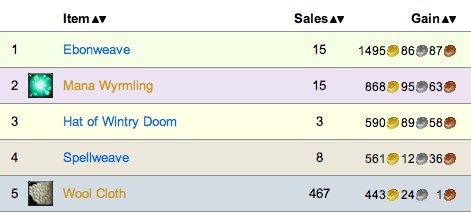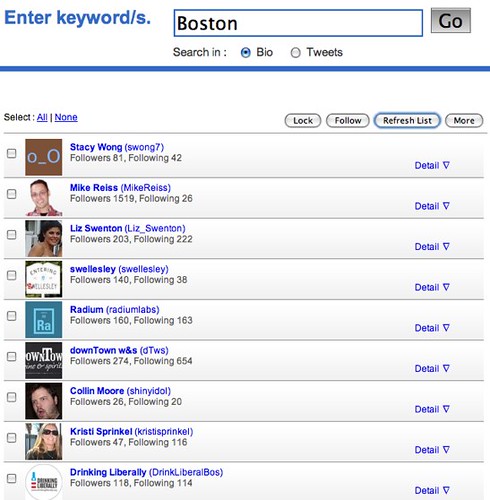I’m an avid gold-maker in World of Warcraft. Like real life, the amount of gold you have in the game is a direct measure of how much value you bring. If you quest like mad and rack up thousands of gold, you’ve got the skills and the time to complete lots of quests. That’s value. If you farm materials like in-game consumables, you’re generating value for other players who don’t have to spend their time farming, and the gold pours in. If you play the Auction House, knowing your markets and trends, you can arbitrage items that are sold for unusually low prices by players that don’t know better and resell them at market prices – and the gold pours in.
What I want to highlight today, though, is an important aspect of the gold making game. Take a look at the top 5 items I’ve sold in game recently:

The first and fourth items are rare cloth that can be made only once every 4 days. Scarcity makes them incredibly valuable. The same is true for item 3, the Hat of Wintry Doom, because it’s made from rare items.
The second item is an in-game pet that can only be acquired in a little-loved backwater part of the world that takes ages to get to. People pay a price premium for it because they don’t want to burn up the time and effort it takes to get there.
What’s really important is item 5, wool cloth. For anyone who does not play World of Warcraft, wool cloth is a commodity. Not only is it a commodity, but it’s an especially plentiful commodity that most early players encounter by the bucket before moving onto more challenging parts of the game. If chess pieces wore clothing, pawns would be the ones sporting wool cloth – it’s common.
So why is such a mundane commodity the #5 seller? Two reasons: first, it’s used by several professions in game, which means there’s consistent demand for it. Second, most players run right past the stage of the game where they’d accumulate a significant amount of the cloth in their pursuit for better, shinier objects. Thus, while it’s plentiful, most players forget about it and move on rapidly, long before they accumulate any significant amount of it.
Consistent demand. High potential supply, low actual supply. This is a profit engine.
So what does this have to do with marketing? How many people are searching for the shiny object, the rare, the Ebonweave cloth of marketing? Social media currently holds this crown, though a few years ago it was SEO, and before that it was email. Everyone wants into the new, the shiny, the really glittery with the high potential payoff, and for those few that do succeed in making the Ebonweave of marketing, the payout is handsome.
But.
But there’s more than enough money in the marketing equivalents of wool cloth. In the rush to social media, people forgot search optimization. In the rush to search optimization, people forgot email marketing. All along the way, there are lots of valuable methods that generate real results and real income, and those rushing to reach Grand Master Social Media Marketer are leaving money and opportunity on the table.
Remember your wool cloth. Revisit the things that used to be hot and see, now that they’ve reached maturity, just how quietly profitable they can be. Some things won’t be any more, but some things perceived as a commodity could still be one of your best sellers if you’re good at it and the attention deficit crowd has moved onto whatever new shiny has appeared for the day.
Good luck farming your wool cloth.
Did you enjoy this blog post? If so, please subscribe right now!



Get this and other great articles from the source at www.ChristopherSPenn.com










